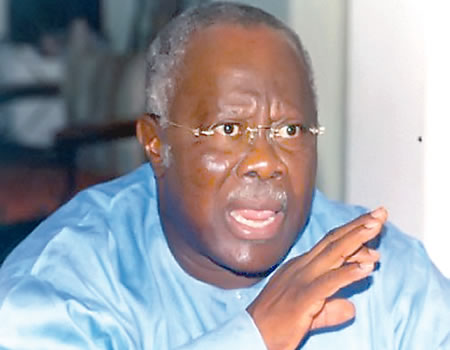Former Deputy National Chairman of the Peoples Democratic Party (PDP), Chief Olabode George, has advised the President of the Dangote Group, Alhaji Aliko Dangote, to ensure that host communities housing the massive refinery project benefit as shareholders, reflecting their inclusivity as part owners.
George gave this counsel while congratulating Dangote on the huge investment in various projects in the area and the success recorded so far, describing him as a businessman and patriot who, through his laudable achievements, was projecting Nigeria’s image globally.
The PDP chieftain, who is also the Atona Oodua of Yoruba land, stated in a message to newsmen on Monday that Dangote should take this step to avoid repeating the mistakes made in the Niger Delta Region and not allow the same to happen in the Ibeju-Lekki/Epe axis of Lagos, the host communities of his Refinery and Petrochemical projects.
He further praised the business guru for helping the indigenes of that area by giving scholarships, describing the gesture as commendable.
“I want to congratulate Alhaji Aliko Dangote. All Nigerians should be proud of him. But, let me advise him: What happened in the oil-rich Niger Delta should be avoided in Lagos. I was told he is helping the indigenes of that area by giving scholarships. This is commendable.
ALSO READ: Food insecurity hits 4.84 million people in Borno, Yobe, Adamawa
“He needs to go further by ensuring that the host communities housing the massive refinery project benefit as shareholders, which would reflect their inclusivity as part owners.
“The project is so massive and eternal that the indigenes of the communities deserve more than employment and training.
It is through equity holding in the company that the people can truly have a sense of inclusiveness, ensuring their inheritance has not been taken away from them for nothing.
“Being a lifetime business, pollution may soon start, and the communities stand to lose from the degradation which the operations of the refinery would impact on the people in the years ahead as the company continues in business.
“This may result in the pollution of their water, which will, in turn, affect their fishing activities,” George said.
Speaking further, Chief George insisted that part ownership in the refinery remains the only way to assuage the pains of indigenes of the host communities for the loss of their inheritances and “make a lot of sense in terms of inclusiveness” rather than scholarships, training, and other empowerment initiatives.
“The part ownership in the refinery is the only way to assuage the pains of indigenes of the host communities for the loss of their inheritances.
Scholarships, training, and other empowerment initiatives are good moves, but for them to be fully involved in this gigantic business as a people whose inheritances were taken away from them, only part ownership of the refinery would make a lot of sense in terms of inclusiveness.
“That project is a very massive one and is eternal. We are talking about the effect of the environmental degradation of the company’s operations, which will be felt by the communities for several years by generations of people of the communities.
It is pertinent to accord the people of Epe and Ibeju-Lekki part ownership of the company. I am looking at 0.1 percent for Epe and the same for Ibeju-Lekki. It can even be higher than this ratio, depending on the magnanimity of Alhaji Dangote and his team,” he said.
“I am offering this patriotic advice because it is not only the immediate host communities within Ibeju-Lekki Local Government Area that would be affected by the environmental impact of the refinery operations.
The impact would be felt by communities along the coastal area of Epe Local Government Area. Several communities beyond Ibeju-Lekki would be affected due to the magnitude of the refinery operations.
“For a massive refinery worth close to $20 billion and which is expected to produce 650,000 barrels of petroleum daily, one can only imagine the impact of environmental degradation that would be unleashed on the host communities.
“So, this fractional percentage in terms of equity holding would be beneficial to the communities, whose commercial activities would be affected by the operation of the refinery,” he added.
